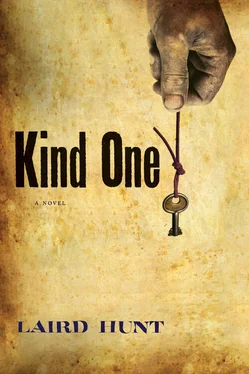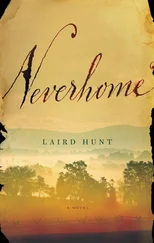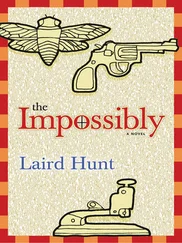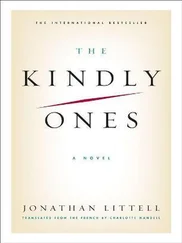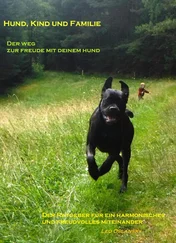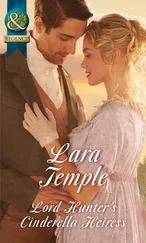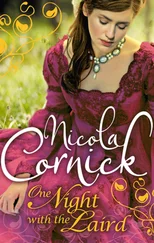The flesh part, the blood part stayed put. Here is why. After that breakfast and after they had poured a bucket of water over my head to wake me up, and put Zinnia’s pig-slop hat back on my head, they dragged me out to the shed and put the shackle on my leg and told me to rest up awhile. That while was three days and three nights. After the second night Zinnia walked in with a bowl of water, and when I grabbed for it, she kicked it over then walked back out. After the third night they had me back into the house to breakfast again with my husband. There was food to it this time. My husband lay like he had. His hair was spilled forward. The rats had found their way in at him. He hadn’t been able to fight them like I had. Hadn’t been able to wake from his sorry sleep and shake a chain at them, toss a kick at them. Zinnia put foodstuff and water before me and told me to eat, or I’d have another breakfast like the last one. I ate. I had a cracked tooth or two but I ate. Cleome sat on the bench outside while I did so. I heard her say to Zinnia she would not set her foot again in that house. They had laid down their blankets in the barn. To sleep where Alcofibras had. Among the animals. Where it was clean.
I ate and imagined my punishment was complete. That my children would now bathe me and put poultices on the bruises they had administered to me and return to their rightful places. That I would take them each by the hand and lead them off down the lane on an outing that would end in the sun somewhere, with peppermint and licorice and sugar candy and a peek at a Chinaman sitting in a black barrel. I looked at Linus Lancaster as I imagined this, and in my looking saw him raise his head up off the table and point the pig sticker at the flour sack behind him and start to sing. He sang “Glory, Hallelujah” as I ate and looked. By and by Zinnia grabbed me up by my scruff and took me out to the oak tree.
“For some seasoning, Mother,” Cleome said, lifting up off her bench. When she lifted you could see clear as crisp-light the condition all that visiting from Linus Lancaster had put her in.
“Keep that old hat on your head while we cook you, Mother,” said Zinnia.
“Stand up straight now, Mother.”
“Please don’t have nothin’ to do with it, Mother.”
“The woods will eat all that hollerin’, Mother.”
“You can cry out those tears later, Mother.”
“Cryin’ don’t help with a thing when that thing is set on coming to pass.”
I breakfasted with my husband all the days following. After the first week Zinnia made me get my own breakfast while she and Cleome waited together on the bench outside. When I wasn’t in there getting and having my breakfast, which was the only meal I got each day, they kept the doors to Linus Lancaster’s house closed so that nothing beside the rats could get in there after him. The pigs, I believe they reckoned, would have made too quick a job.
I don’t know what it was they discussed while I was at my breakfast. It may not have been much. There was never a good deal of talking between them. Even when we were all younger. There had never been a great deal of discussion between my husband, Linus Lancaster, and myself, so that hadn’t changed much with the situation either. He had liked to talk at me a fair amount, and I had listened as he did so and looked to my work. So to keep a sense of balance where there was none any longer, I talked at him now during those breakfasts while Cleome and Zinnia waited outside on the bench, and while he listened and looked to the work of being dead as a doorstopper. I talked at his forehead, which was ever dripping forward and pooling up on the table and sogging toward the edges and spooling toward the floor, and I talked at his hair, which had a blue sheen on it that had probably settled down from the stink stuck to the dust that had always been in that air. I talked to his shoulders and his brown, heavy cloth shirt, and his big hands glowing yellow and purple and gray in the kitchen light.
At first it was just things about whippings and being beat and the nothing work they’d set me to that came out of my mouth like the thought that runs a black garble through a mind and can pass, if you petition it kind enough to, for anything you ever hoped it could be. Then I told him about how he had never ought to have come up to my father’s house in Indiana and fetch me. How he ought to have left me to my corner in that house and to my church up there above the river, where there had been other Christians to commune with and where they hadn’t minded if every now and again I would sing.
“I have a pretty voice,” I said to my husband.
“You never built your big house with its fifty-foot porch and its wide staircases and its columns and gables,” I said to him.
“Look at you dead now,” I said. “When you took us all to that carnival in Albatross, you ought to have let me have those stockings I saw or brought back Cleome and Zinnia that bag of candy. You ought never to have whipped Alcofibras, let alone until he was dead. You ought never to have started your visiting down the hall or taken your boot to me in your bed. A pig is a filthy thing and here I am still eating it for my breakfast, and how, husband, do you like how your dream about the greensward turned out?”
I said these things to my husband with the pig sticker in his neck, and the house beyond him no longer seemed like it had anything to do with me or the six years of my life it had bitten the head off, and I crunched my breakfast and when I came out into the light and fresh air, Cleome and Zinnia would be waiting. At the first days, Zinnia would take me by the arm or the scruff, but after a time she would just shove me on along in front and the two of them would follow me out to wherever they had set my chore for the day. One morning it was mowing spring grass with the hand sickle. Another it was clearing rocks. I thought once or twice that I could have run away from Cleome, but Zinnia was like hell with wings, and no matter what lead I could have conjured, she would have chased me down and smashed my bones to powder. Even when Linus Lancaster had laid his hands on me I had never felt so infirm. Zinnia was all quiet, then all noise. Like it was coming out with her sweat, clouding into steam.
Once, after they had left aside the regular chores and settled into making me dig holes — as deep as my head, then fill it up and start again — Zinnia leapt down into the hole with me and hit me with her fists and elbows until they had to haul me out of there with a rope. This was the hole I should have had dug for Alcofibras she said as they hauled me up. This was the hole would have kept him soft and safe and quiet, not left to the snakes and cold winds under a blanket of rocks.
“You can keep digging holes until your hands fall off, Mother,” she said.
“I will,” I said.
“I know you will.”
“I’ll never stop.”
“No, you won’t.”
“First my fingers will fall off, then my hands, then my wrists, then my elbows, then the rest of my arms.”
“And you will still keep digging.”
“Yes.”
For her part, Cleome got quieter as her time passed. Her small face grew wider and her eyes larger, and her hair fell with fresh oils that caught the sunlight.
I would tell Linus Lancaster about all this at our breakfasts together. I would eat pork and mush and look at his dead forehead and talk at him about how the angel he had carried on his shoulder sat on Zinnia’s shoulder now and about how quiet Cleome was and how there was a sweetness somewhere sipping at that quiet and how far she had gotten along.
Sometimes I picked up my talking at the end of the day when I was lying on the dirt floor of the shed. It wasn’t unusual that my lips were too cracked to move nice enough for real talk, so I would just run it in my head. Linus Lancaster, you are dead and I am lying out here with a shackle on my ankle, and Cleome is grown bigger and bigger, and Zinnia is fixing to strike me down so I won’t come up again. The rats are in there at you, and then they’ll come out and look to me, and everything they ever sang in those old songs about the hard places a body can come to are true.
Читать дальше
